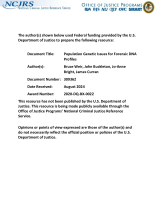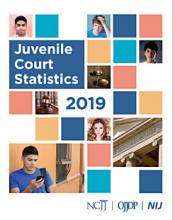Demography (scientific discipline)
Estimation of Population-specific Values of Theta for PowerPlex Y23 Profiles
CHANGING DISTRIBUTION OF BIG-CITY CRIME - A MULTI-CITY TIME-SERIES ANALYSIS
DNA mixture interpretation of SNP sequencing data for investigative genetic genealogy
Population Genetic Issues for Forensic DNA Profiles - Draft Final Report, January 1, 2021 - June 30, 2023
Too Sensitive or Not Sensitive Enough? Sensitivity to Context and Justice-involved Youths' Response to Violence Exposure
A multisite examination of women veterans in veterans treatment courts: a gendered comparison of demography, criminal history, program requirements, and substance use and mental health issues
Preliminary assessment of three quantitative approaches for estimating time-since-deposition from autofluorescence and morphological profiles of cell populations from forensic biological samples
The Relationship Context of Early Transitions to Parenthood: The Influence of Arrest
Expert versus Youth Raters on Measuring Social and Therapeutic Climate in Secure Juvenile Placement
Understanding the Implementation and Impact of Credible Messenger Mentoring on Youth Across Settings
Incivilities Thesis: Theory, Measurement, and Policy (From Measuring What Matters: Proceedings From the Policing Research Institute Meetings, P 65-88, 1999, Robert H. Langworthy, ed. -- See NCJ-170610)
Forensic Anthropology Casework Performance: Assessing Accuracy and Trends for Biological Profile Estimates on a Comprehensive Sample of Identified Decedent Cases
Age-at-death patterns and transition analysis trends for three Asian populations: Implications for paleo demography
Innovative Methodologies for Assessing Radicalization Risk: Risk Terrain Modeling and Conjunctive Analysis
Juvenile Court Statistics, 2019
Augmenting, Analyzing, and Archiving Criminal Trajectories in Four Birth Cohorts from the Project on Human Development in Chicago Neighborhoods, 1995-2023
Demography, Police Behavior, and Deterrence
Going Home (or Not): How Residential Change Might Help the Formerly Incarcerated Stay Out of Prison
Dr. Kirk discusses how Hurricane Katrina affected those formerly incarcerated persons originally from New Orleans and their likelihood of returning to prison. Kirk also discussed potential strategies for fostering residential change among those who were incarcerated, focusing specifically on parole residency policies and the provision of public housing vouchers.
See the YouTube Terms of Service and Google Privacy Policy





